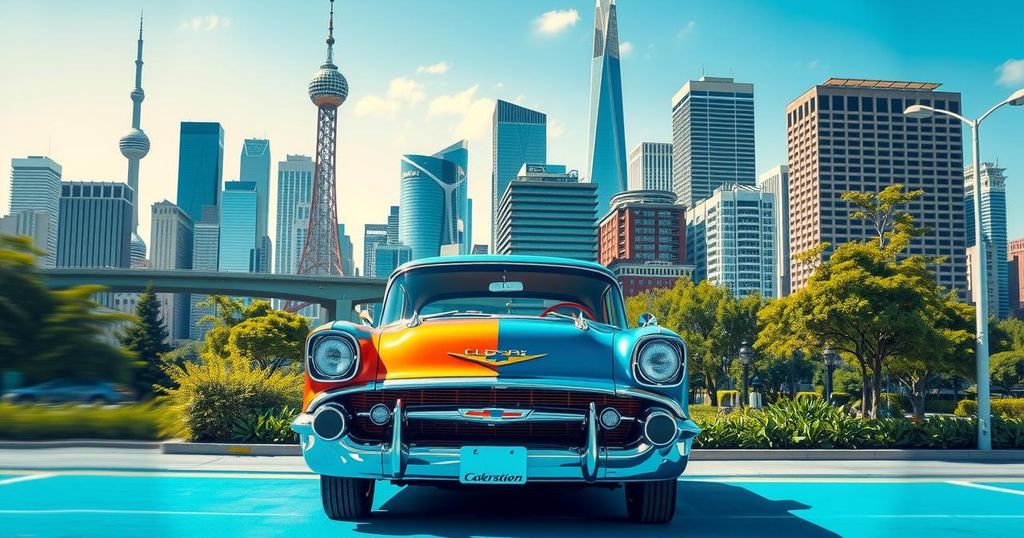Chevrolet vs China: The Battle for the Future of Uzbekistan’s Auto Industry
Uzbekistan’s automotive industry, historically dominated by Chevrolets, is experiencing a major shift due to the rise of electric vehicles from Chinese manufacturers. Following President Mirziyoyev’s market liberalization, varied options like Kia and BYD are emerging. However, urban reliance on Chevrolets persists due to serviceability issues. Enhanced competition and economic adjustments are anticipated as the market evolves, promising increased consumer choice and accessible pricing.
In Uzbekistan, the automotive landscape is shifting as the dominance of Chevrolets begins to face challenges, primarily due to the rising popularity of electric vehicles (EVs) from Chinese manufacturers. Presently, approximately 90% of the vehicles in Uzbekistan are Chevrolets, with a striking 80% of them being white. However, with the global rise of EVs, this long-standing Chevrolet monopoly is being reassessed.
Islam Karimov, Uzbekistan’s first president, established the country’s automobile industry by partnering with South Korea’s Daewoo in 1996, followed by General Motors’ acquisition of Daewoo in 2002. Consequently, this partnership fostered a local automotive base, leading to the establishment of over one hundred auto-related companies, benefiting the economy through employment and technology transfers.
Since the passing of Karimov in 2016, President Shavkat Mirziyoyev has taken significant steps to open the market. The introduction of foreign automotive brands, including South Korea’s Kia and Hyundai, as well as China’s BYD and Changan, became significant post-2017. A notable collaboration between UzAuto Motors and BYD resulted in the establishment of a production facility in Jizzakh, targeting an annual production of 50,000 EVs.
Recent sales figures reveal remarkable changes in the market dynamics, with Chevrolets comprising the majority of vehicle sales in 2024. Nonetheless, the emergence of domestic brands like Kia and BYD reflects an increased variety of options for consumers. Experts like Farkhodjon Israilov note the broadening choice, emphasizing the influx of various car brands, including luxury options such as Porsche.
Despite these changes, rural areas such as Andijan continue to rely heavily on Chevrolets due to factors such as availability of spare parts and the expertise required for vehicle maintenance. Electric vehicles, although appealing, are viewed as more expensive regarding initial investment and servicing costs, which may deter potential buyers.
Conversely, market sentiment appears to be shifting. Sherzod Yuldashev from Runking Motor Group reports an increasing acceptance of electric vehicles, with annual sales demonstrating a trend toward EV consumption. Acknowledging the growing support infrastructure for EVs, he and other experts predict that as technology advances, EVs will become increasingly attainable for the general public.
Chevrolet faces challenges with its product lineup, as its offerings have diminished, prompting the need for new competitive models. In response to increasing imports, the Uzbek government has introduced non-tariff barriers to safeguard local production, although these measures may not completely halt the influence of Chinese EVs.
As competition escalates, both local manufacturers and Chevrolet have started adjusting pricing strategies to entice consumers. The expansion of car options has invigorated the market, shifting towards a more competitive and diverse automotive environment in Uzbekistan. According to Israilov, the reality of market economics is fostering better pricing structures, benefiting consumers by enhancing choices and potential innovation in the domestic automotive sector.
The automotive industry in Uzbekistan is undergoing significant transformation as it navigates the challenges presented by the growing presence of Chinese electric vehicles. This shift is marked by an increasing diversification of car brands in the market, altering the long-held dominance of Chevrolet. While the transition presents hurdles related to cost and infrastructure, rising consumer interest in EVs signals a pivotal change in the automotive landscape, emphasizing the importance of competition and innovation. The future appears to prioritize diverse choices for consumers, enhancing the overall auto industry in Uzbekistan.
Original Source: timesca.com




Post Comment